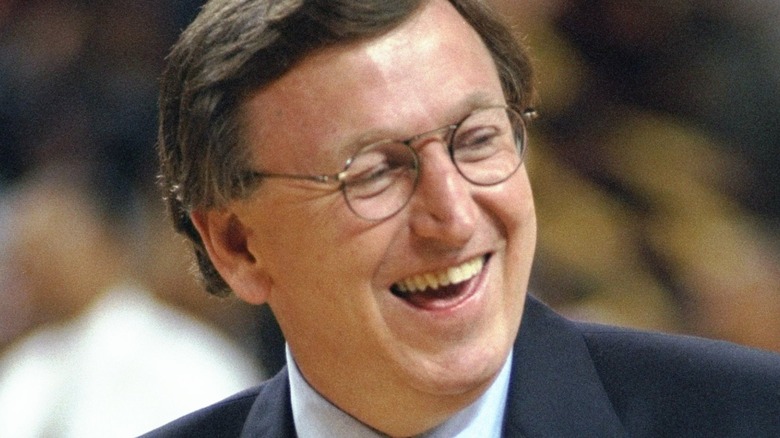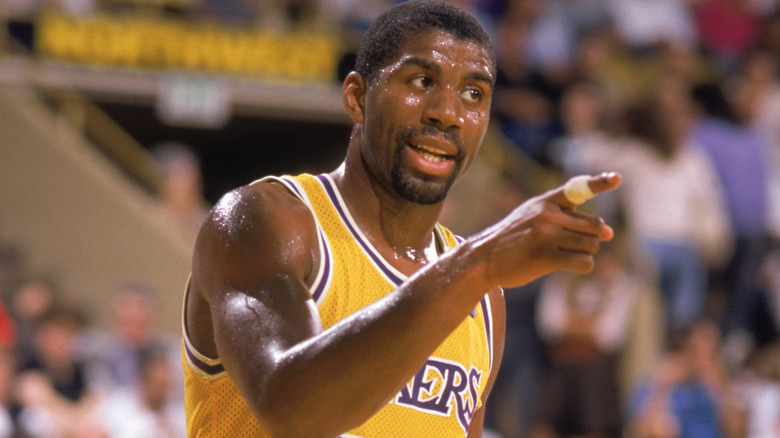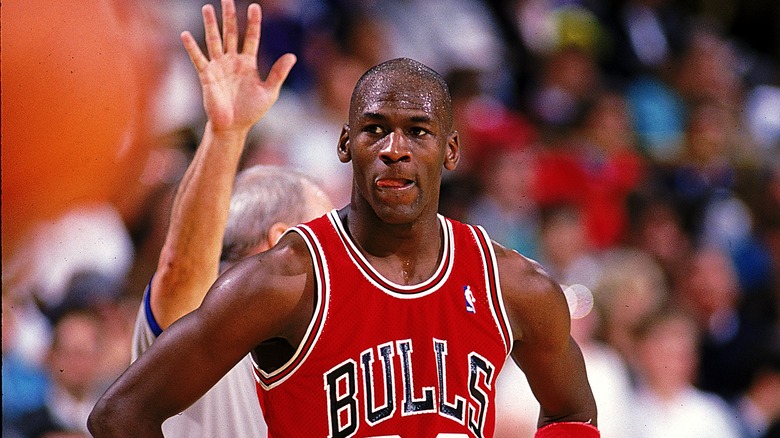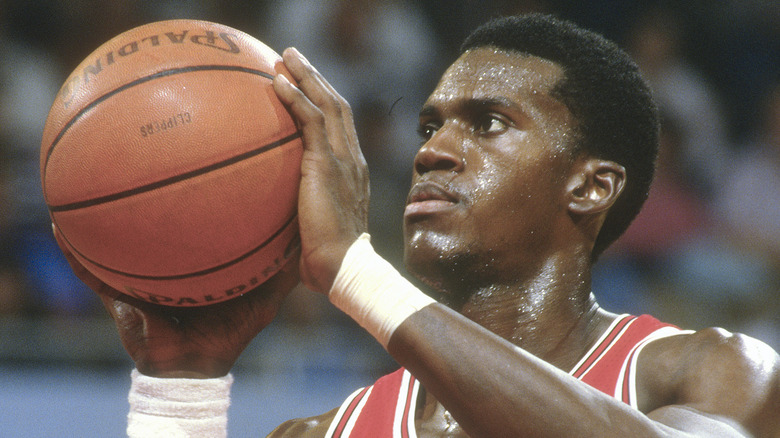An Incorrect Coin Flip Forever Changed The History Of The NBA
Prior to the introduction of the draft lottery in 1985, the NBA did things differently when determining who gets to pick first overall in the annual rookie draft. From 1966 to 1984, the teams with the worst record in the Eastern and Western Conference got to flip a coin, with the winning team getting the first pick, the losing team getting the second, and all the other teams selecting in inverse order based on their regular-season records. This led to some classic boom-or-bust, almost Peyton Manning vs. Ryan Leaf-level scenarios with the No. 1 pick becoming a Hall of Famer and the No. 2 pick proving to be a dud.
One of the most infamous examples of such took place in 1969 when the prior year's two expansion teams, the Milwaukee Bucks and Phoenix Suns, participated in the coin flip. The Bucks won the flip and selected UCLA's Lew Alcindor (the future Kareem Abdul-Jabbar), who would lead Milwaukee to a championship in only his second season and retire as the NBA's all-time leading scorer. The Suns settled for another center, Florida's Neal Walk, and while he averaged over 20 points and 12 rebounds in 1972-73, he was pretty much washed-up by the age of 26 and out of the NBA at 28. Ouch.
Ten years after that coin flip came another example of a boom-or-bust situation, one where the team that made the incorrect call could have started collecting championships well before it won its first of many.
The Lakers and the Bulls took part in the coin flip for 1979's top pick
Ahead of the 1979-80 NBA season, the worst teams in the Eastern and Western Conference, respectively, were the Chicago Bulls and the newly-relocated Utah Jazz, who played the previous season in New Orleans. But since the Jazz surrendered their 1979 first-round pick to the Los Angeles Lakers when they previously acquired their multiple-time All-Star guard Gail Goodrich, the Lakers were scheduled to take part in the coin flip with the Bulls.
Looking back with the benefit of hindsight, the coin flip was essentially the Magic Johnson sweepstakes, as the Michigan State point guard had, by far, the best career out of everyone selected in the 1979 NBA Draft. But there were other hot prospects that seemingly had an outside chance of getting selected first, including UCLA power forward David Greenwood, Arkansas guard Sidney Moncrief, and San Francisco center Bill Cartwright. But even without hindsight taken into account, Johnson was arguably the most logical top pick. He had just won a national championship with the Spartans, and as an unusually tall point guard, he averaged close to a triple-double in both his college seasons.
Heading into the coin flip, Bulls general manager Rod Thorn (pictured above in the 1990s) called heads, going with the results of a recent fan poll. Chicago was in need of a point guard, and Johnson was a generational talent. All things considered, both the Bulls and the Lakers had a 50-50 chance of winning the flip, and when the coin landed ...
The Lakers won the coin flip, but Magic was hoping to play for the Bulls
... it came out tails. The Los Angeles Lakers had the No. 1 pick in the 1979 NBA Draft, and as we all know, they used that selection on Magic Johnson, who went on to enjoy a legendary 13-season career in the purple and gold, with five championships and numerous individual accolades. Johnson undoubtedly proved to be a great fit with the Lakers despite how would-be general manager Jerry West wanted the team to draft eventual fifth overall pick Sidney Moncrief instead (via The Wrap). But the future Lakers icon actually would have preferred to play in Chicago, as his then-attorney, George Andrews, later revealed.
"Magic was very positive about Chicago because it was close to home as a Lansing, Michigan guy. It would have been an interesting situation," Andrews said, as quoted by the NBA's official website. The attorney noted that Johnson felt Bulls center Artis Gilmore was a comparable talent to the Lakers' Kareem Abdul-Jabbar and that the Bulls could have had a formidable big three with Gilmore, Johnson, and high-scoring guard Reggie Theus, one that had the potential to become even better with Jerry Sloan taking over as Chicago's head coach in the 1979-80 season. "They would have been very good," Andrews speculated. "That would have been a tough team to match up with."
Could the Bulls have become a championship team with Johnson, and not Michael Jordan?
Assuming the Chicago Bulls did end up with Magic Johnson and he didn't take his talents elsewhere after a few seasons, it's not farfetched to speculate that they wouldn't have been in the running for Michael Jordan in the 1984 NBA Draft. They did, after all, return to the playoffs in 1980-81 with a lineup led by Gilmore and Theus — Ricky Sobers was solid as their point guard, but the man was no Magic, plain and simple. Could the Bulls with Johnson have won at least a few championships well before Jordan, Scottie Pippen, and the rest of the crew won six titles in the 1990s? That just might have been a possibility.
With Johnson off the board, the Bulls chose David Greenwood at No. 2 overall in 1979, and he had a career that could charitably be described as decent but unspectacular. (He did win one championship, albeit as a benchwarmer for the Detroit Pistons in 1990.) Strong first few seasons aside, he wasn't that much of a consolation prize for a Bulls team that wasn't just having trouble winning games but was also having a hard time putting butts in seats (via NBA.com).
On the other hand, Greenwood could have been a useful addition to the Lakers; aside from being a hometown hero who played for UCLA, he was also a power forward, which the 1979-80 Lakers needed. (Los Angeles soon addressed that need by acquiring Spencer Haywood, a once-stellar player whose personal demons affected his play — and his attitude — in his one season with the Lakers.) Besides, the Lakers already had a pretty good point guard in Norm Nixon.
There were other problems that held the Bulls back before Jordan
The Chicago Bulls before Michael Jordan may have had a talented core that could have been championship-caliber if Magic Johnson was included in the mix, but the organization also had other problems that compromised their success in the lead-up to 1984. Per NBA.com, coaching changes were an issue — Jerry Sloan eventually spent more than two decades coaching the Utah Jazz, but his tenure with the Bulls lasted little more than two and a half seasons. The Bulls then went through a revolving door of coaches before Jordan's arrival, including the Lakers' former championship-winning coach Paul Westhead in 1982-83 and GM Rod Thorn himself in the last 30 games of the 1981-82 campaign.
Drugs were another hindrance to the Bulls in the early '80s, and even when Jordan joined the team, there were four players — Orlando Woolridge (pictured above), Quintin Dailey, Ennis Whatley, and Dirk Minniefield — who eventually came clean about their drug use (via NBC Sports). The aforementioned issues and others may have made for a toxic environment for Johnson had the Bulls won the 1979 coin flip and picked him first overall, though it bears mentioning that many of his 1980s Lakers teammates weren't saints either (via GQ).
All what-ifs aside, both the Bulls and the Lakers became dominant franchises for several years on end, though in the case of Chicago, they simply had to wait a few years before finding their franchise superstar, as Thorn pointed out. "Obviously, it worked out great for both teams," he added.




